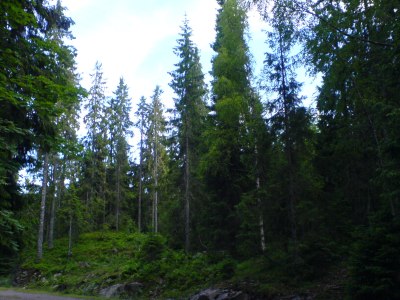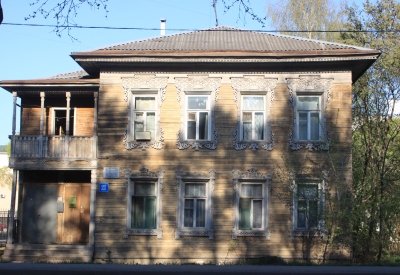 I am visiting my home town in Russia for holidays. I have not been home for 3 years and I have not lived there for 12 years. Many things surprise me. One of the features of contemporary life in my home town is the relentless and often destructive onset of capitalism. As I have said already, currently patriarchy has joined forces with capitalism in order to suppress nature and oppress women.
I am visiting my home town in Russia for holidays. I have not been home for 3 years and I have not lived there for 12 years. Many things surprise me. One of the features of contemporary life in my home town is the relentless and often destructive onset of capitalism. As I have said already, currently patriarchy has joined forces with capitalism in order to suppress nature and oppress women.
One of the ways capitalism does this is by involving women and men into an endless rat race and by substituting their Wild Nature (as Dr Clarissa Pinkola Estés describes it) with an identity of a consumer. People willingly put on masks of consumers who live to make money and to spend it on entertainment which is sold to them.
The city is filled with numerous chain supermarkets and covered in two types of adverts: one promoting credit agencies and debt consolidation, and another type for agencies for dealing with debt collectors.
Life seems to be revolving around taking out loans and paying – or, as a general rule, not paying – off debt.
 Some scenes from city life might appear as progress. For instance, there is more entertainment for children: more rides, bouncy castles, and play rooms. However, this is only the first impression. As you look the second time, you can see that these playgrounds all look very unnatural among traditional historical wooden architecture with intricate carving, and among tall old trees. In addition, all these rides and play rooms charge a lot of money for their services, and so most of the time they sit unoccupied – as do the young people working there.
Some scenes from city life might appear as progress. For instance, there is more entertainment for children: more rides, bouncy castles, and play rooms. However, this is only the first impression. As you look the second time, you can see that these playgrounds all look very unnatural among traditional historical wooden architecture with intricate carving, and among tall old trees. In addition, all these rides and play rooms charge a lot of money for their services, and so most of the time they sit unoccupied – as do the young people working there.
Plastic materials and bright colours of bouncy castles contrast sharply with the sand, chocolate and emerald hues of the old town. Eerie stillness of these overpriced entertainment centres creates a feeling of a ghost town.
I touched a tree which grew by one of these playgrounds. The tree emitted gentle energy. It was gentle, but it felt stronger than anything that surrounded it. It was quiet, but it overpowered all capitalist buzz around.
 The tree gave me a vision of the time before the playground, when the neon plastic had not been here. There was just a glacial lake on the top of a hill and trees around it. I belonged to that world as a child. Then the tree took me further back: this time I was not even there, it was the school time of my Mom. It was even quieter, but fuller. Dust was more visible, but so were sparrows and people. The city was filled with joy and hope, human connections crisscrossed the city and held it together. There were no mobiles or tablets. People talked to each other, agreed to meet or simply dropped in on each other. People had tea, held conversation, sang songs and played in amateur theatres.
The tree gave me a vision of the time before the playground, when the neon plastic had not been here. There was just a glacial lake on the top of a hill and trees around it. I belonged to that world as a child. Then the tree took me further back: this time I was not even there, it was the school time of my Mom. It was even quieter, but fuller. Dust was more visible, but so were sparrows and people. The city was filled with joy and hope, human connections crisscrossed the city and held it together. There were no mobiles or tablets. People talked to each other, agreed to meet or simply dropped in on each other. People had tea, held conversation, sang songs and played in amateur theatres.
People still do these things in my town, but there is a definite sense of defiance in these actions. There is a strong feeling that we are going against the current. At the same time, this feeling gives even more significance to our human interactions, and brings more satisfaction. We do something despite dominant capitalist dictum: “Borrow and buy”.
 This is the problem with Feminism and Religion in our world: the message of patriarchy and capitalism is much more visible. Capitalism is a shouting man in its own adverts, advertising himself.
This is the problem with Feminism and Religion in our world: the message of patriarchy and capitalism is much more visible. Capitalism is a shouting man in its own adverts, advertising himself.
The message of Feminism and Religion is ultimately stronger. That tree that spoke to me will be there when neon colours are gone and the debts are written off – unless, of course, some developer finds a way to change laws and builds the whole lake and area around it over.
The message of Feminism and Religion speaks to your true self. It leads to satisfaction. The catch is that in order to come in contact with the call of Feminism and Religion one has to pause and listen. And this is exactly what capitalism would not let you do. You have to be constantly on the move. You have to earn more in order to spend more.
All the while you will be given a destructive identity: patriarchal man or a woman acceptable to patriarchy. You will never pause, you will never listen to a tree or to the voice of your wild nature.
Awareness is crucial. Raising awareness is an important task. Many people have awoken to the fact that capitalism and patriarchy must be met head on. Many people who are engaged in spiritual and creative activities know from experience that each spiritual and creative act is an act of war against capitalism and patriarchy.
Spiritual and creative practices, performed regularly, is the best path leading from lifelessness of capitalism to stillness of true life.
Oxana Poberejnaia was an Officer of the University of Manchester Buddhist Society while studying for a PhD in Government, and has been involved in organising the Manchester Buddhist Convention, now in its 9th year. Oxana is now exploring the Sacred Feminine through marking seasonal festivals, working with her menstrual cycle, frame drumming and shamanic journeying, while keeping the practice of Buddhist meditation. Oxana is an artist and an author. She teaches frame drumming and meditation. Her works can be found on her blog.
http://poeticoxana.wordpress.com


Amen.
LikeLike
Thank you, Carol
LikeLike
It’s hard work to not fall for the patriarchy/capitalist trap.
LikeLike
Yes, and not just Buddhism, but many other religions talk about this difficulty. In Christianity they talk about “the straight and narrow”. In Islam, I believe, there is a parable about heedfulness: the gates to Heaven only open for a moment in a millenia, and a person should be heedful in order to catch that moment.
LikeLike
What is the name of your home town and in what part of Russia is it located? How long, or for how many generations, has your family lived there? Pre-Revolution? I think Putin thinks he’s a tsar. He owns the whole country.
LikeLike
Hello, Barabara! The name of the city is Tomsk. It is in the forest of Taiga, on the River Tom, which flows into the great River Ob, which flows into the Arctic Ocean. My family has not lived there long at all. This is a region of settlers in general, Slavic peoples have only lived there for four centuries. And my Mother’s family only came there in the 1950s, and my Father moved there in 1978. Before that, my Mother’s family had lived in Russia (European part, as we call it – this means to the west of the Urals), and my Father’s family are from Ukraine and Poland. Putin us a subject of a whole different conversation. You can write at my personal email if you want. :-)
LikeLike
I loved your reflections when connecting with the tree; so lovely. In that space is where I go as well, often imaginably and ritually, and as often as I can physically. Thank you for writing and sharing this piece.
LikeLike
Thank you for your kind words, Darla.
LikeLike
Patriarchy/capitalism is like a treadmill. Once we step upon it, it is nearly impossible to stop and get off. I think it has done a great deal to destroy the middle class which was once so strong and stable in America. Those of us who were adults during the eighties and nineties saw it happen. Unfortunately, our eye witness evidence will expire with us. Thank you for being the eye witness in your home town; and for sharing your story with us.
LikeLike
Hello, Anina! So true! I also often feel like a last eye witness to things. Like the Soviet Union, for example. Unless I tell the story of how it was for us, growing up in the 1980s there, how happy we were – know one will. It is so important to stand up as witnesses to what we know is true. Otherwise the Big Brother with his Newspeak will destroy us and our past, present and future.
LikeLike
What gives meaning to life? Certainly not the next purchase, but the connections to…the tree in our yard, our neighbor across the street, our friends and family, our community. Why is it so hard to find these meaningful connections? I think you’re right, Oxana — capitalism’s treadmill gives us no time to even realize what we’re missing.
LikeLike
Oxana and Anina, that is.
LikeLike
Hello, Nancy! Thank you so much for reading and for your thoughtful reply! Yes, time. I mean, even on the most basic level, when a friend or a therapist tells you: listen to yourself, give yourself time to pause, to settle, to give the situation time – it sounds like wishful thinking! No one has time nowadays. You have to run. I think most people do realise that it’s connnection which gives meaning to their lives. However, after sitting around campfire and singing a thought creeps in: Am I wasting my time? What if my colleagues outrun me while I am doing nothing? Capitalist traits become part of our personalities, just like our yearning for truth, just like our need for connection. Mindfulness helps separate the wheat from the chaff and to see where various compounds of what we consider “ourselves” come from. Thank you again for your kind support! It means a lot.
LikeLike
Reblogged this on All things spiritual.
LikeLiked by 1 person